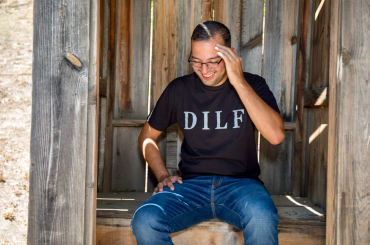It’s not every day that a world-conquering recording artist personally texts you to confirm an interview—but as the appointed time for DJ Times’ face-to-face with MSTRKRFT’s Al “Al-P” Puodziukas and Jesse F. Keeler approaches, a message comes in from Puodziukas himself. “Hey, we’re checked, fed, watered and settled. Where do you wanna do this?”
As it turns out, the Toronto-based Puodziukas and Keeler—who were in New York City as part of a short tour to promote the latest MSTRKRFT opus, the analog-synth-driven Operator—were not only serving as their own press wranglers, but also as their own tour managers, and even their own roadies. The pair had just flown into the U.S. that morning, and apparently had a bit of trouble with the border patrol. As Keeler, who doubles as one-half of Death From Above 1979, recalls, “The agent asked, ‘What is this?’ ‘It’s a 909.’ ‘What does it do?’ I could have told her anything, like, ‘It’s nuclear test equipment!’ Finally, after she scanned and swabbed it, she was like, ‘Well, I still don’t know what this is.’ Finally, she called over to her supervisor, and she immediately said, ‘Oh, are you a DJ?’”
Herding equipment through customs, setting up interviews—it’s a return to the DIY, punk-tinged roots of MSTRKRFT, and it’s an ethos that flows through Operator, the veteran pair’s third album in a decade-plus of releases, remixes and live dates. Gone are the buffed, pop-tinged tunes of the last MSTRKRFT effort, 2009’s Fist of God; in their place are raw synth-manglings that recall the pared-down joy of early acid house and the grittiness of industrial music. And while Fist of God featured guest vocal turns from John Legend and Lil’ Mo, among others from the R&B and hip-hop world, Operator boasts contributions from the likes of Jacob Bannon (from metalcore combo Converge) and rock savant Ian Svenonius. It’s MSTRKRFT’s leanest and meanest release yet, the product of a band distilling its sound to its stripped-down, visceral core.
“With Fist of God, we were thinking, hey, R&B and dance music are going to combine, and we want to be at the forefront of that,” the loquacious, charmingly goofy Keeler explains over a beer at their hotel’s bar. The pair had another goal in mind when recording began on the new record. “We wanted to work in a completely different way with Operator,” the marginally more businesslike Puodziukas says. “The way that we did this record was kind of like the way that Jesse and I made music in our more rock-ish, pre-MSTRKRFT bands—only instead of having that rock-ish orientation, we’re using electronics.”
For starters, MSTRKRFT purposely chose to work with a limited palette of instrumentation. “The core of the record is really all [Roland] 808, 909 and 707—those three drum machines,” Keeler says. “It’s stuff that we had already, and while we’ve used them on our records before, we never relied on them as much as we did on this one. On a lot of the tracks, the 909 was the master clock. And if someone wanted to throw those tracks into a computer and attempt to put them on a grid, they’ll be watching everything sort of skate around. The whole thing is really imperfect.”
That imperfection gives the album a dynamism that electronic music can sometimes lack. “It makes it feel a little bit more alive,” as Puodziukas explains. “But accepting the imperfections is hard, when you’ve become accustomed to everything being so ‘right.’ It’s hard to think past that.”
Adds Keeler: “Beyond that, we each were using a modular synth. We’d find a happy place for a while, but then we’ll be, ‘Oh this should be here, and that should be there.’ There’s always some slightly different thing that seems like it has to happen.”
And aside from effects, those drum machines and modular synths were all it took to put the album together. Says Puodziukas: “We wanted to have as few sources to record as we could get away with.”
Mirroring that bare-bones instrumentation, the duo opted to keep the layering to a minimum as well, contributing to Operator’s rugged, hammer-it-out feel. “The track count is super-low,” Puodziukas explains. “I think our highest track count was 14, even accounting for effect returns and things like that. And the least, on ‘Little Red Hen,’ was three.
“We consciously wanted to work with a low track count from the start,” Puodziukas continues. “But it was also a function of the instrumentation. It was like, ‘There are no choices to be made. These are the only pieces that we have to work with.’”
The following evening, DJ Times caught the pair performing live—and much like the album, their current live set is a pared-down, tough, hard-charging affair, the sound of two guys and their machines teaming up for a boisterous bang-a-thon.
“We use basically the same gear live as we do in the studio,” Keeler says “and when you play with the same gear as you record with, it’s exactly the same as being in a band. A recorded song is something that exists, and when you perform that song, you’re trying to get to a representation of the thing that people are familiar with—but it’s impossible to nail the exact same thing.”
And for MSTRKRFT, that’s the whole point of playing live. “If we wanted to give people the exact same thing, we would just DJ the songs,” Keeler says. “But we are a band, and we play like one. We’ve joked that it’s like covering our own songs—but that’s what a band does every day. Unless you’re lip-syncing, you’re doing a cover version of your creation. What we’ve found is that when we perform songs from the record, moments of improvisation will just take over. What you get when you see us live is never the same as the record.”
That effort pays off—the live gig’s crowd, an ungainly mix of hipsters, techno purists and people whose main interest was in the event’s free vodka, were won over by the rambunctious set, greeting MSTRKRFT’s twisting buzzsaw workouts with stomping feet and pumping fists.
“When everything is going right, sometimes you’ll hear the sound of the crowd reflecting what your brain feels about the moment,” Keeler says. “It’s really inspiring, and I think it’s why we keep doing this, and keep going though the extra effort of playing this way.”
In truth, the night’s set was closer to punk than it is to EDM. Keeler and Puodziukas, both in their personalities and through the MSTRKRFT sound, are about as far away from the ego-laden excesses and the buildup-and-breakdown–driven music of much of the EDM scene as you can get. They both noticeably cringe when asked what their place is within that scene.
“I feel like we’re a whole separate entity,” Puodziukas says. “We don’t identify with that world or that term at all, really. Especially with this record.” Keeler comes up with an apt analogy: “We’re like that weird kid from school who only has one friend and is always playing by themself. And that’s the way we like it.”








